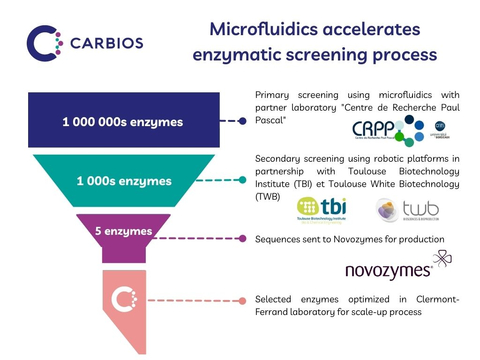Business Wire India
- Carbios has developed an ultra-high throughput microfluidic screening of PET-depolymerizing enzymes in partnership with the Paul Pascal Research Center1, a joint research unit of the CNRS2 and the University of Bordeaux
- Microfluidics enables millions of enzymes to be screened in a day, compared with a few thousand a week with conventional technologies
- Future polymers of interest will benefit from this acceleration of the R&D phase, enabling Carbios to develop its portfolio of innovations on different types of plastic more rapidly
Regulatory News:
This press release features multimedia. View the full release here: https://www.businesswire.com/news/home/20230417005658/en/

Microfluidics accelerates enzymatic screening process (Photo: Carbios)
Carbios (Euronext Growth Paris: ALCRB) (Paris:ALCRB), a pioneer in the development and industrialization of biological technologies to reinvent the life cycle of plastics and textiles, has accelerated its enzyme screening process with a microfluidic technology developed in partnership with the Paul Pascal Research Centre (a joint research unit of the CNRS and the University of Bordeaux, which specializes in microfluidics). This cutting-edge technology enables the screening of millions of enzymes in just one day, speeding up the process to optimize enzymes breaking down PET. This competitive advantage enables Carbios to reduce the time between the R&D phase and the production of its proprietary enzymes, and therefore to develop concrete solutions to plastic pollution even faster.
"Since having applied microfluidics to our screening process more than a year ago, we have analyzed millions of enzymes, which would have taken years beforehand," explains Prof. Alain Marty, Chief Scientific Officer at Carbios. "This technology gives access to a large variety of enzymes in record time. Microfluidics has enabled us to optimize the enzyme presented in 2020 in the journal Nature, and it is this optimized enzyme that will be used in our first industrial reference unit in 2025."
"Microfluidics is already widely used in medical diagnostics to analyze biological samples. When Carbios approached us to use it for new industrial applications, this was a first," said Jean-Christophe Baret, Professor at the University of Bordeaux and team leader at the Paul Pascal Research Center hosted by the CNRS. "We are very pleased to develop new methods using the power of microfluidics for an environmental cause such as the reduction of plastic pollution."
Microfluidics: the science of droplets
Microfluidics allows the production of devices handling very small amounts of liquid. Each droplet generated can be considered as an independent microreactor having a volume in the picoliter range (10-12 liters) and containing a particular enzyme whose PET depolymerization activity will be screened. These droplets move through analysis units the size of a microchip allowing ultra-high throughput screening of 150 enzymes per second.
Previously, conventional robotic systems allowed screening in microplate format with a volume in the milliliter range (10-3 liters) and with rates of around one enzyme per minute.
The use of microfluidics to screen for more efficient or new enzymes will become widely adopted in the coming years, therefore accelerating the development of bioprocessing. Currently used by Carbios for the development of its PET depolymerization process, microfluidics should be used to accelerate the development of new enzymes for other types of plastic such as polyamide.
Carbios researchers specialized in microfluidics
Microfluidic processes require special expertise. At present, two researchers at Carbios are dedicated to microfluidics and based in the cooperative laboratory with TBI3 hosted by INSA4 Toulouse. Alexandra Tauzin, Researcher in Enzyme Engineering and Microfluidics, and Alexandre Gilles, Engineer specialized in robotics, work in partnership with the Paul Pascal Research Center.
About Carbios
Established in 2011 by Truffle Capital, Carbios is a green chemistry company, developing biological and innovative processes. Through its unique approach of combining enzymes and plastics, Carbios aims to address new consumer expectations and the challenges of a broad ecological transition by taking up a major challenge of our time: plastic and textile pollution. Carbios deconstructs any type of PET (the dominant polymer in bottles, trays, textiles made of polyester) into its basic components which can then be reused to produce new PET plastics with equivalent quality to virgin ones. This PET innovation, the first of its kind in the world, was recognized in April 2020 in a scientific paper published on the front cover of the prestigious journal Nature. Carbios successfully started up its demonstration plant in Clermont-Ferrand in 2021. It has now taken another key step towards the industrialization of its process with the construction of a first-of-a-kind unit in partnership with Indorama Ventures.
In 2017, Carbios and L’Oréal co-founded a consortium to contribute to the industrialization of its proprietary recycling technology. Committed to developing innovative solutions for sustainable development, Nestlé Waters, PepsiCo and Suntory Beverage & Food Europe joined this consortium in April 2019. In 2022, Carbios signed an agreement with On, Patagonia, PUMA, and Salomon, to develop solutions promoting the recyclability and circularity of their products. PVH Corp. joined this consortium in January 2023.
The Company has also developed an enzymatic biodegradation technology for PLA-based (a bio sourced polymer) single-use plastics. This technology can create a new generation of plastics that are 100% compostable at ambient temperature, integrating enzymes at the heart of the plastic product.
For more information, please visit www.carbios.com/en / Twitter: Carbios LinkedIn: Carbios Instagram: insidecarbios
Carbios (ISIN FR0011648716/ALCRB) is eligible for the PEA-PME, a government program allowing French residents investing in SMEs to benefit from income tax rebates.
Translation is for information purposes only.
In case of discrepancy between the French and the English version of this press release, the French version shall prevail
1 Centre de Recherche Paul Pascal (CRPP)
2 Centre National de la Recherche Scientifique (CNRS) = National Center for Scientific Research
3 Toulouse Biotechnology Institute
4 National Institute of Applied Sciences
View source version on businesswire.com: https://www.businesswire.com/news/home/20230417005658/en/
![]()
